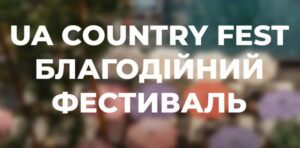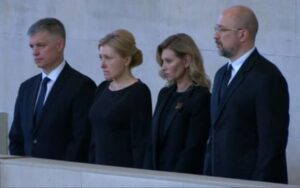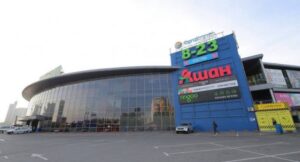
Recently, there was information that 12 Ukrainian establishments have merged into one network — Enjoy Group.
In addition to the classical background, the restaurants are connected by a common goal — to organize charity events and conduct promotions, the funds from which will go to the urgent needs of Ukrainians who need support.
So, on the last weekend of September, the first charity festival from the Enjoy Group will be held on the territory of the country complex Queen Country Club.
UA Country Fest is a traditional festival with entertainment content, where you will be able to meet a food court with establishments of the Enjoy Group network. Eat snails from Frou Frou, try khinkali from neo-obstro Takakhuli, order dishes from Ishak and Fish Fetish, watch an open-air movie, attend a master class, walk through a market with Ukrainian brands and take a photo as a souvenir in the photo zone.
September 24 and 25 are two days that will affect the well-being of orphans from the Ochakiv boarding school. After all, all funds from the sale of entrance tickets will be transferred to the construction of a new room for 60 children with the assistance of the “Blagomai” charitable foundation, which has been supporting children deprived of parental care for more than 10 years. And since the first days of the full-scale invasion, he has been evacuating children from hot spots to safe places in Ukraine and abroad.
Thus, recreation and a minimum contribution of 200 hryvnias per entrance will be able to help little Ukrainians.
Queen Country Club, September 24th and 25th from 11:00 a.m. Come with family and friends to enjoy the last weekend of September outside the city and be part of a good mission.


The Expert Club YouTube channel has released another video review of current events and activities for the next week. In the new issue, the founder of the Club of Experts Maksim Urakin spoke about the main news in Ukraine and the world from August 19 to 25, 2022.
So, in Ukraine next week, several major events are expected to be dedicated to economic recovery and business support during martial law. In particular, the largest conference on youth entrepreneurship and student startups in Ukraine Startup Campus will start on Wednesday, the main speaker of which will be the Deputy Prime Minister – Minister of Digital Transformation of Ukraine Mykhailo Fedorov, and on Thursday the annual Richelieu Forum dedicated to the architecture of a new model of public service will start.
In the world next week, the most anticipated event will be farewell to Queen Elizabeth II of Great Britain. The ceremony is expected to be attended by many world leaders. In the economy, the main news could be a possible change in the monetary policy of the US Federal Reserve System, analysts predict a 30% chance of raising the Fed’s discount rate by 1 percentage point.
Football will dominate next week’s sporting events. As part of the qualification for the 2022 World Cup and the European League of Nations, important matches of the national teams will be held, among which one can single out the fundamental confrontation between two old rivals – Brazil and Argentina. More about this on the sports portal sport.ua.
For a full review of these and other events, see the new video on the Club of Experts channel at the link:
You can subscribe to the Expert Club channel here –

Prime Minister of Ukraine Denys Shmygal announced that he, together with the First Lady of Ukraine Olena Zelenska, arrived in London to pay respects to Queen Elizabeth II.
“At the invitation of the British side, we arrived in London today to pay respects to Her Majesty King Elizabeth II and express condolences on behalf of the President, Government and people of Ukraine. The Queen enjoyed great public and favor in the United Kingdom. She was also admired far beyond the Kingdom, including Ukraine,” Shmygal wrote on his Telegram channel on Sunday evening.
The Prime Minister also noted that Elizabeth II “was the head of state, who was one of the first to lend a helping hand when Ukraine was faced with a barbaric Russian invasion. States that are still doing everything possible to bring our victory closer.”
In addition, Shmyhal expressed gratitude to the government of the United Kingdom.
The state funeral of Queen Elizabeth II, who died on September 8, will be held on Monday in London.

The Deposit Guarantee Fund (DGF) put up for auction in the Prozzoro.Sales system a number of assets of the insolvent MR Bank, including the Magellan shopping and entertainment center (SEC) in Kyiv at a starting price of UAH 3.1 billion, according to a press release. FGVFL release.
According to him, the area of the sold mall on the street. Academician Glushkov, 13b is 28.5 thousand square meters. m.
As part of other lots, a property complex with an area of 13 thousand square meters. m in the Khmelnitsky region and the right to claim under two loan agreements and receivables.
The auction is set for October 12th.
As reported, on February 25, 2022, the National Bank of Ukraine revoked a banking license and liquidated banks controlled by the Russian Federation: JSC International Reserve Bank (formerly Sberbank) and Joint Stock Commercial Industrial Investment Bank (PJSC Prominvestbank), which is 99.77% owned by PJSC Sberbank of Russia and the State Development Corporation VEB.RF.
The Magellan shopping and entertainment center was previously one of the assets of the Kray group of businessman Anatoly Yurkevich. In mid-September 2017, the Antimonopoly Committee of Ukraine granted permission to Sberbank PJSC (Kyiv) to acquire the assets of Krai Property in the form of an integral property complex of the mall.

Net sales of dollars by the National Bank of Ukraine rose to $510.7 million last week compared to $475.0 million a week earlier and $231.4 million two weeks earlier.
According to the information of the National Bank on its website, from August 12 to September 16, it purchased $17.5 million, which is 2.5 times more than the previous week, but sold $528.2 million compared to $482 million a week earlier.
This week, on the cash market, the hryvnia again weakened by about 50 kopecks, and its rate came close to the level of UAH 42/$1, while the official rate of UAH 36.57/$1 was fixed since July 21.
As reported, in August the volume of interventions of the National Bank in the market increased slightly – to $1.33 billion from $1.2 billion in July, but still remained much less than in June ($3.96 billion), May ($3.4 billion) and April ($2.2 billion).
Finance Minister Serhiy Marchenko said that in August the volume of foreign aid to Ukraine amounted to a record $4.6 billion since the beginning of the war, compared with $1.7 billion in July and $4.4 billion in June.
In general, from the beginning of the year to September 16 inclusive, the NBU purchased $3 billion 114.2 million and EUR111.0 million on the market, and sold $17 billion 862.8 million and EUR1 billion 789.1 million.
Including since the beginning of the war, the purchase of foreign currency has reached $2 billion 457.3 million and EUR111.0 million, and the sale – $14 billion 92.6 million and EUR1 billion 789.1 million.
The international reserves of Ukraine as of September 1, 2022, according to the NBU, amounted to $25.436 billion (in equivalent), which is 13.6% or $2.679 billion more than at the beginning of August. In July, the fall in reserves amounted to 1.6%, or $371.5 million, in June – 9.3%, or $2 billion 343.8 million.

The international fintech market has replenished with a new large and interesting player. We are talking about the Hungarian company Volgende Kft, which is actively and successfully investing in various start-ups, and also helps businesses come up with new solutions to attract customers.
As you know, in recent years, the market for fintech services around the world has been gaining momentum, crowding out traditional markets. First of all, conservative banks, which often cannot fully adapt to the needs of depositors and borrowers, had to move. At the same time, new companies are engaged in a fundamental change in the technological order, which makes it easier to provide services to the client. It’s not just about the purely financial system. Fortunately, the field for the use of digital technologies is now unusually wide.
In this context, Volgende Kft, a new player in the venture investment market, is very interesting. Despite a short period of activity, the company from Hungary works super-successfully on it.
Tuned for modern technologies, Volgende Kft has successfully invested in a number of projects related to fintech. Given the number of startups – not always successful – you need a keen eye to determine whether this or that project “will take off”. Or the resource spent on this or that technology will not pay for itself, although it looks bright.
Volgende Kft specialists are experts in investment appraisal. Actually, this is what the business strategy is based on: there is a sale and purchase at the early and late stages of large fintech startups.
“We use in-depth industry knowledge and new technologies to create your business that will stand out from the crowd and make money,” say representatives of Volgende Kft.
The company’s competitive advantage also bases on the fact that it works with the world’s largest funds. In general, this allows us to say that Volgende Kft has all the prospects to become a top company.
Moreover, the line of projects it has is very long: after all, you need to track and buy effective fintech solutions in different areas. We are talking about computer services, and work with the insurance system. Also we do not forget about other areas – such as the development of systems for the delivery of goods.
The tasks of Volgende Kft are absolutely clear: it creates the future for business.
“We provide organizations with cost-effective customer and technical support, resulting in fast response times and high user satisfaction,” the company says.
It should be clear that digital technologies are constantly evolving. And business representatives very often need solutions that will quickly attract customers with a high-quality product right in a smartphone or laptop.
“We use profound knowledge of industry and new technologies in order to create your business that will stand out from the crowd and make a profit” – Volgende Kft.
There is no doubt that such an innovative approach will definitely yield results. After all, it is the future.